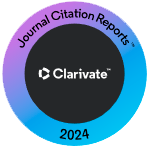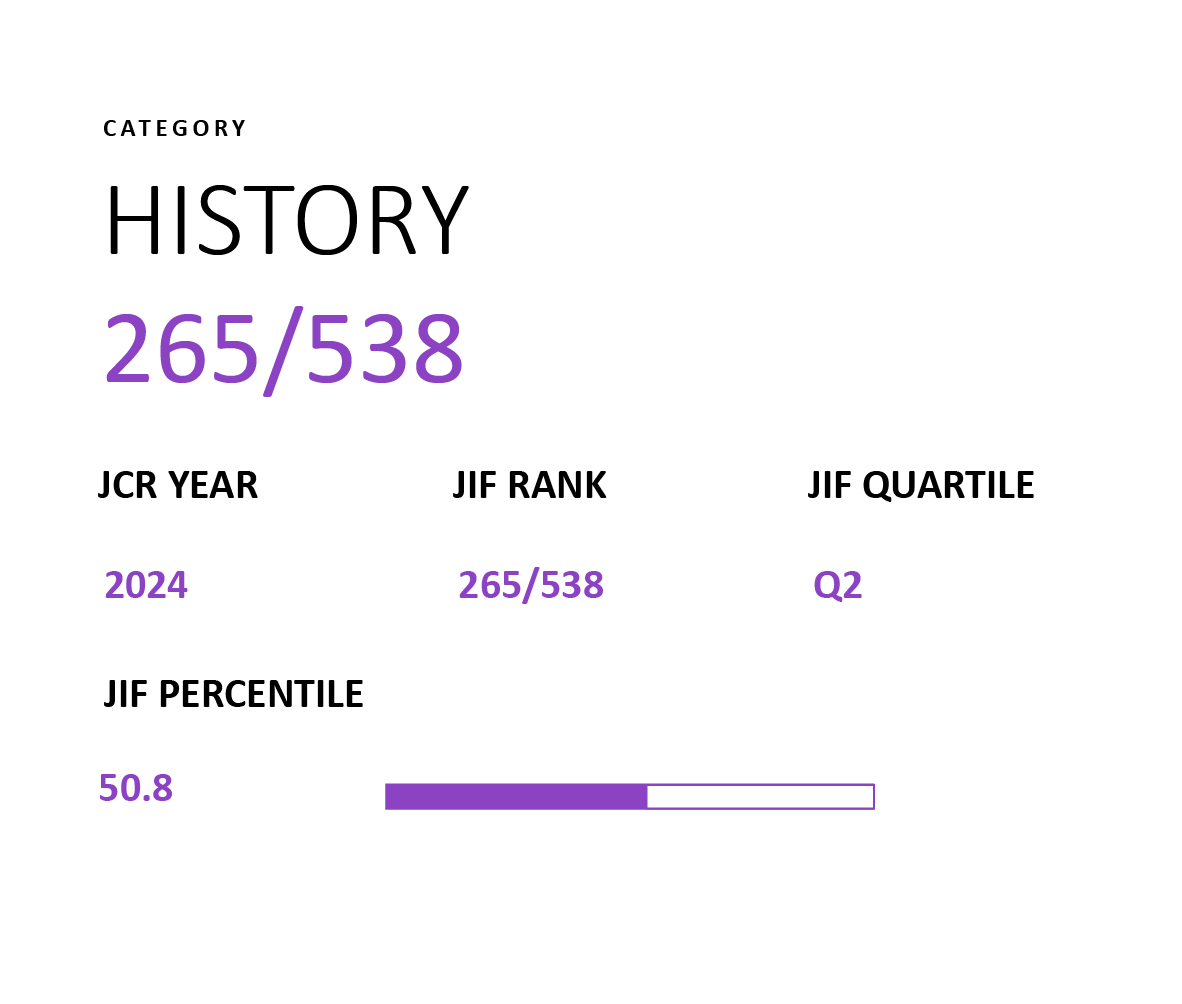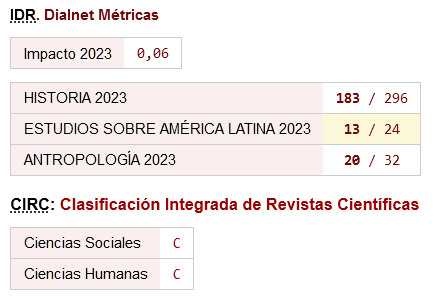Submissions
Submission Preparation Checklist
As part of the submission process, authors are required to check off their submission's compliance with all of the following items, and submissions may be returned to authors that do not adhere to these guidelines.-
R.upo
Author Guidelines
AIMS & SCOPE
Americanía: Revista de Estudios Latinoamericanos, with ISSN 2174-0178, has been biannually edited since 2011.
Americanía is a plural journal, which willingly receives and hopes for reflection and discussion about America. The aim is to promote and spread scientific progress on the Latin American History field and some other related disciplines. In view of the current expectations and challenges that America is facing, understanding the historical matter is determinant in order to reflect its diverse realities.
This journal is proposed as an academic space where researchers from different origins and fields are allowed to fruitfully exchange latest scientific advance on the Latin American History field.
Each submission will be reviewed under scientific methods. It will first pass through our Editorial Board. Then, two external referees will evaluate it by a double blind peer review. In order to evaluate each manuscript, it is compulsory to present a report by two experts. In case of discrepancy, the Director may ask for a third referee’s review. Reviewers are external to the Publisher and the Editorial Board. Their evaluation will be binding for decision-making.
Methodological reviews will be applied on certain articles. Authors may suggest potential reviewers.
THANKS TO THE AUTHORS IN ADVANCE FOR READING THESE RULES. IT WILL ACCELERATE THE EVALUATION AND EDITING PROCESS.
SCOPE AND POLICY
Americanía: Revista de Estudios Latinoamericanos has as its main objective to collaborate in the diffusion of the growing number of original research results, theoretical studies, short communications, etc. that are carried out in Spain and in the international field on the History of Latin America and other related disciplines written in Spanish, Portuguese and English.
Researchers and professionals working in the field of History, Social and Human Sciences may publish in this journal. Articles must be original, unpublished and relevant and will not be presented simultaneously in any other publication. The Editorial Board understands that the opinions expressed by the authors are their exclusive responsibility. For this purpose, it is necessary to send to the Journal by mail or scanned, the agreements of diffusion and originality that can be found in the section "Recommendations to authors".
ORIGINAL ARTICLES
The Journal has different sections: articles and new research papers. Those who wish to collaborate must comply with the following rules:
- The deadlines for submission of originals are divided into two.
January publication: from 1st January to July 1st.
July publication: from July 2nd to December 30th.
The original articles that are received after the deadline will be considered for the next issue.
ARTICLE TEXT
- Articles will have a maximum length of 80,000 characters (with spaces).
- Articles must present the following general structure: Introduction (justification of the study and objectives), methodology, analysis and interpretation of the results, conclusions and bibliographical references.
- The authors must indicate any financing of agencies and/or projects from which the research article has arisen.
• The articles must be signed with the full names and surnames of the author, author or authors.
PRESENTATION OF PAPERS
Papers will be sent in computerized form through the OJS (Open Journal System) tool that can be found at the following link:
http://www.upo.es/revistas/index.php/americania
To do so, you must register as an author. The file will be uploaded without identification data in order to send it to the external evaluators. The following rules of presentation must be respected:
- The text processors used are .doc, .docx (Word) and .odt (OpenOffice). for Windows, DIN A4 format. Printed on one side only, with 1.5 cm. spacing and 3 cm. margins (top, bottom, left and right). Font: Times New Roman; size: 12. The text should be written without word cuts, tabulations, or page breaks.
- A title and abstract (150 words maximum) should be provided in English and Spanish, and will follow the IMRAD (Introduction, Methods, Results and Discussion) format whenever possible. Five to six descriptors or key words in both languages should be included below the abstract.
- Notes, if any, should be footnotes and numbered consecutively.
- Textual quotations of three lines or less will be incorporated within the text, in italics and between quotes; quotations of more than three lines will be in a separate paragraph, in italics and with quotes.
- Illustrations (graphs, tables, figures, etc.) will only be provided when they are essential and in a separate document. Each table must be identified by a number and a descriptive title. The author must identify all the sources used and indicate which place each table should occupy in the text.
Figures should be numbered separately from tables, and should also be identified with a descriptive title. The sources of each figure should be identified, and the author should clearly indicate where each figure should be placed in the text.
If the article is accepted for publication, the author is responsible for obtaining permission to reproduce the images. The images must be submitted in high quality digital format.
- Every article should have a section called Bibliographical References / References in which the different references of the sources cited within the text are listed, in alphabetical and chronological order.
Below, we set out the guidelines that the references should follow, both in the footnotes and in the section on Bibliographical References:
a. Books: Surname/s of the Author/s, Name/s, Book’s title (in italics), Publisher, Place of publication, Year of publication. Example:
Adelman, Jeremy, Frontier Development: Land, Labour, and Capital on the Wheatlands of Argentina and Canada, 1890-1914, Oxford Univ. Press, New York, 1994.
Subsequent references: Adelman, Jeremy, Frontier Development, 122-23.
O'Phelan Godoy, Scarlett y Ricketts, Mónica, eds., Homenaje a Jorge Basadre: El hombre, su obra y su tiempo, Pontifica Universidad Católica del Perú, Instituto Riva-Agüero / Universidad del Pacífico / Instituto Cultural Peruano Norteamericano, Lima, 2004.
Subsequent references: O'Phelan Godoy, Scarlett y Ricketts, Mónica, eds., Homenaje a Jorge Basadre, vi.
Original publication’s date included: López de Gómara, Francisco, Historia general de las Indias y vida de Hernán Cortés, ed. Jorge Guerra Lacroix, Madrid, (1552), 1941.
b. Book’s chapters: Surname/ s of the Author/s, Name/s. Chapter’s title (inside quotation marks), in Surname/ s of the Author/s, Title (in italics), Publisher, Place of publication, Year of publicatio, page/s. Example:
Burns, Edward Bradford, "Cultures in Conflict: The Implication of Modernization in Nineteenth-Century Latin America", en Bernhard, Virginia ed., Elites, Masses, and Modernization in Latin America, 1850-1930, Univ. of Texas Press, Austin, 1979, 22-23.
Subsequent references: Burns, Edward Bradford, "Cultures in Conflict", 33.
If the edited collection has already been referenced, in the following reference where it appears, even if it is another article from the same publication, a reduced reference of that publication can be used:
Williams, Verónica y Cremonte, María B., "Mitmaqkuna o circulación de bienes? Indicadores de la producción cerámica como identificadores étnicos, un caso de estudio en el Noroeste argentino", en Lorandi, Ana María ed., El Tucumán colonial y Charcas, Univ. Nacional de Buenos Aires, Facultad de Filosofía y Letras, Buenos Aires, 1997, 75-83.
Cruz, Rodolfo, "La construcción de identidades étnicas en el Tucumán colonial: Los amaichas y los tafíes en el debate sobre su 'verdadera' estructura étnica", en Lorandi, Ana María ed., El Tucumán colonial y Charcas, 65-92.
c. Reference a paper with several volumes: Surname/s of the author/s, Name/s, Title (in italics), number of volumes, Publisher, Place of publishing, Year, Volume: page/s. Example:
Lohmann Villena, Guillermo y Sarabia Viejo, María Justina, eds., Francisco de Toledo: Disposiciones gubernativas para el virreinato del Perú, 1575-1580, 2 vols., Escuela de Estudios Hispano-Americanos, Sevilla, 1986-89, 2:237-38.
Subsequent references: Lohmann Villena, Guillermo y Sarabia Viejo, María Justina, Francisco de Toledo, 2:237-38.
Reference of a single volume: Socolow, Susan, ed., The Atlantic Staple Trade, vol. 1, Commerce and Politics, VT: Variorum, Brookfield, 1996.
d. Unpublished thesis: Author surname(s), Title in quotation marks, Doctoral thesis, University, Year of publication, Page. Example:
Haslip, Gabriel J., "Crime and the Administration of Justice in Colonial Mexico City, 1696-1810", PhD thesis, Columbia Univ., 1980, 170.
e. Journals: Author surname(s), Title of journal article in quotation marks, Name of journal in italics, Place of publishing, Volume number, Year of publication, Pages. Example:
Citation of an entire journal article:
Suárez Bilbao, Fernando. "La costumbre indígena en el derecho indiano", Studia Carande, Madrid, 1, 1997, 99-130.
Restall, Matthew, "A History of the New Philology and the New Philology in History", Latin American Research Review 38, no. 1, 2003, 113-34.
Citation of a specific page or several pages:
Itier, César, "Lengua general y comunicación escrita: Cinco cartas en quechua de Cotahuasi - 1616", Revista Andina 9, no. 1, 1991, 65.
f. Newspapers: Name of newspaper in italics, Place of publishing, Date of publication, Page. Example:
La Prensa, Managua, 10 Oct. 1946, p. 7. The author’s name must be included if it is available.
g. Interviews: Identification of interviewee, interviewer, and place and date of interview.
h. Archive’s source: if you are citing abbreviations of various archives, you must include a list of abbreviations at the beginning of your notes:
The handwritten citations must always include an identification of the document (which normally includes a date), the name of the collection or section in which the document is included, the place where the document is located (archive, museum, library…) and the city. Whenever possible, bundles and pages of the collection shall be indicated by name or number. Examples:
Domingo Faustino Sarmiento a Juan Pujol, Buenos Aires, 22 May 1860, Archivo General de la Nación, Buenos Aires, Archivo del General Justo José de Urquiza (Hereafter AGN, Urquiza), bun. 67.
Subsequent citations: Domingo Sarmiento a Juan Pujol, Buenos Aires, 22 May 1860, AGN, Urquiza, bun. 67.
Lefebre de Bécourt al Ministro de Asuntos Exteriores, Ciudad de México, 23 Sept. 1861, Archives du Département des Affaires Étrangères, Paris (hereafter AAE), Correspondance Politique (hereafter CP), vol. 38, p. 231.
Subsequent citations: Lefebre de Bécourt al Ministro de Asuntos Exteriores, Ciudad de México, 23 Sept. 1861, AAE, CP, vol. 38, p. 231.
Donación de tierra a favor de Pedro de Ávila y Zárate, Talavera, 1697, Archivo Histórico de Tucumán (hereafter AHT), Protocolos, ser. A, box 3.
Título de Propiedad de Juan Román, Tucumán, 1697, AHT, Protocolos, ser. A, box 3.
Juan Ramírez de Velazco al Consejo de Indias, Salta, 20 Apr. 1588, Archivo General de Indias, Sevilla, Audiencia de Charcas (hereafter AGI, Charcas), bun. 26, doc. 1.
i. Web pages: Author surname(s), Title of article in quotation marks, Name of journal in italics, year of publication, email address (Date of reference). Example:
De la Torre Curiel, José Refugio, "Con la sierra a cuestas. Apaches y españoles en la frontera sonorense en el siglo XVIII", Nuevo Mundo Mundos Nuevos, 2011, http://nuevomundo.revues.org/60707 (Consulted on dd/mm/yyyy)
j. Abbreviations:
Ibid. refers to the cited work on the immediately previous note, and it indicates that the material that is cited afterward is identical. It can not be used when more than one work has been cited on the previous note.
Op. cit., loc. cit., and idem can not be used. For repeated citations, you must use the author surname, their name, the main title (without subtitles) and the pages.
The specific pages must be cited whenever possible.
Inclusive and Non-sexist Language
It is recommended that authors use inclusive and non-sexist language, including in the bibliography the full names of the people who have participated in their research. When writing an article in Spanish, it is advisable to consult the GUIDE TO GOOD PRACTICE FOR INCLUSIVE USE OF LANGUAGE, by CSIC.
EDITORIAL PROCESS
- Americanía Journal is based on the Code of Good Scientific Practices of CSIC from March 2010 and the guidelines on good publication practice by the Committee of Publication Ethics (COPE).
- Submission’s reception will be notified once the Secretary’s Office receives it and once it has been verified that it accomplishes the requirements specified in those policies. After its revision, it will be sent to the Editorial Board in order to evaluate whether the submission corresponds to the thematic field and also its interest. It will be then sent to the Experts Board. These are selected according to the article’s field of knowledge, even though authors may suggest potential reviewers.
- After it has been evaluated and a period has passed, the Editorial Board will notify the author whether the article has been accepted. Changes will be attached alongside the Journal’s number in which it will be published, if applicable. The articles which do not meet the standards will be returned.
- Scientific Board will look after quality control of evaluation reports, for which there are principles. In order to review some of the articles, methodological reviews will be applied.
- Priority is firstly determined with the approval of the article by two external experts. Amongst these, better-evaluated articles and those resulting from a research will be prioritised. Final criterion will attend to its arrival date and its adaptation to the subject.
- Style editors and reviewers are used for texts in English.
- Editorial Board may introduce relevant changes in compliance with the rules previously described.
- Original articles will not be returned.
CURATION PROCESS
- Once the article has been received, two specialised reviewers from the Experts Board will be selected.
- The article will be sent to them from the Secretary’s Office without any information about the author(s). They will also receive the publication rules and the appraisal report, which they must submit duly completed and signed.
- The review might result in: rejected, accepted with major changes, accepted with minor changes, accepted and priority publication.
- After receiving the expert’s review, it will be notified to the author. They will also receive the changes.
- The article and the changes will be returned to the Secretary’s Office with a letter specifying which changes have been made. These will be, once again, evaluated by the previous reviewers.
- Once they have confirmed that the matters indicated have been responded to, the author will be notified with their resolution.
HOW TO CITE
It is important that the Journal be cited in this way: “Americanía: Revista de Estudios Latinoamericanos”. Example:
CORONEL FREIJÓO, R. (2011). Los indios y la revolución de Quito: 1757-1817. Americanía: Revista de Estudios Latinoamericanos, 1, 26 - 41.
Monográfico
This section includes research articles, evaluated by external peers, included in the issues dedicated especially to the topics decided by the editorial board.
Dossier
The Dossier is a group of invited articles, which address a common theme, can be a regular issue of the Journal or comprise part of one. The Dossiers, like the other articles published in our journal, follow the external peer review process.
Copyright Notice
Unless otherwise indicated, all contents of the electronic edition are distributed under a "Creative Commons Attribution-NonCommercial-ShareAlike 4.0" (CC-BY-NC-SA) licence. (CC-BY-NC-SA). You can consult the informative version and the legal text of the licence here. This must be expressly stated in this way when necessary.
Privacy Statement
The data controller of the personal data provided for the journals to which Revistas UPO gives access is the journal Americanía. Revista de Estudios Latinoamericanos. To consult additional and detailed information on data protection, please contact the journal Americanía. Revista de Estudios Latinoamericanosat the address indicated in "about/contact".
You are also informed that the Universidad Pablo de Olavide acts as Data Processor for each of the files owned by the different journals. Therefore, the Universidad Pablo de Olavide, facilitates the exercise of their rights of access, rectification, deletion, limitation of processing, data portability, opposition and not to be subject to automated individual decisions, including profiling by contacting the headquarters of the Universidad Pablo de Olavide, located at Ctra. de Utrera, km. 1 41013, Seville (ES), or requesting it by email to the address deleg.protecciondedatos@upo.es, accompanied by proof of identity.









